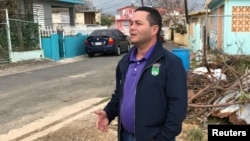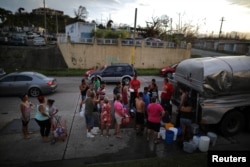Standing in the yard of her home in Guaynabo on Sunday, Rosymar Diaz greeted an unexpected visitor on the other side of her chain-link fence: the city's mayor, Angel Perez.
Diaz's neighborhood of modest concrete homes in a San Juan suburb of 100,000 people had been badly damaged in Hurricane Maria. Destroyed tin roofs were piled on every corner and a telephone pole still leaned alarmingly across the street, a pair of shoes dangling from wires now just a few feet off the ground.
Perez had come to check on residents and ask how he could help.
Diaz, 40, had a ready answer: Without power in the hurricane's aftermath, her medication for multiple sclerosis had gone bad. She had already missed one weekly dose and was now two days away from missing another.
The mayor pulled out a folded piece of paper from his pocket and jotted down the information on his growing list of residents' needs. He assured Diaz he would do what he could, including sending ice she could use to chill new meds when they arrived. "If she needs ice every week, then we'll be here every week with some ice," he said.
Like other mayors across storm-ravaged Puerto Rico, Perez has been working from early morning until late at night since Hurricane Maria struck the island, managing public shelters, delivering food and water to residents and handing out tarps.
The localized work of some mayors, and Puerto Ricans in general, came under fire last week from U.S. President Donald Trump, who implied in tweets that some on the island are not helping clean up Maria's mess.
San Juan Mayor Carmen Yulin Cruz sparked the president's comments when she criticized his administration's response in Puerto Rico, calling it a "life-or-death story." Trump accused Cruz, who had to move to a shelter because of damage to her home, of "poor leadership," and lumped in her with "politically motivated ingrates" who "want everything done for them." He also said Puerto Rico's recovery "should be a community effort."
'A beacon for every Puerto Rican'
Yet in Puerto Rico, community efforts - often led by mayors - comprise the bulk of the immediate response in Maria's wake, according to many on the ground.
Ruth Tobar Martinez, 52, charging her phone at one of the few sidewalk outlets with electricity in San Juan's Condado neighborhood, defended Cruz on Wednesday, calling Trump's criticism of Puerto Ricans "offensive."
"Ever since she's become mayor, she's been a beacon for every Puerto Rican - even if they're not from San Juan," Tobar said. "She was up to her waist in water after Maria, still hugging people. For Trump to disrespect the Puerto Rican people by insulting her, it's the lowest of the low. He's an embarrassment to the U.S."
Across Puerto Rico, residents say they still have not been visited by Puerto Rican government or federal workers but that mayors or municipal representatives have been checking in and doing what they can.
On the island, a U.S. territory, towns function almost as small fiefdoms. Each of Puerto Rico's 78 municipalities, no matter how tiny, has its own mayor - and mayors hold outsized power.
"Politics is different over here in Puerto Rico," Perez said. "During my campaign I walked probably to 140 neighborhoods." In crises, he says, "We're the first people in touch with everyone. They look to us for everything."
Maria, the strongest storm to hit Puerto Rico in nearly 90 years, struck on Sept. 20 and the mayors have had heavy loads since then. Ninety-five percent of the island remains without power and in many areas, it is unlikely to be restored for months. Food, water and fuel are still scarce.
'Bring food and water'
In rural Salinas, a town of 30,000 people located 50 miles (80 km) south of San Juan, Mayor Karilyn Bonilla Colón is visiting residential areas, walkie-talkie in hand, and focusing on basics. "People tell me,'I have money but I can't get it, I can't buy anything,'" she said. "This is my priority right now: Bring them water and food."
Traveling along dusty back roads on a motorized buggy with a flatbed in back, Bonilla on Friday assessed the needs of Julio Rodriguez, 77.
Four feet (1.2m) of floodwater during the storm had turned Rodriguez's home into an unsanitary maze of dried mud, broken glass and wrecked furniture. In dirty jeans, he led Bonilla through his living room, pondering when he might live there again. "Months," he said. "Maybe more than a year."
Later, Bonilla met up with Roberto Alomar, a Salinas native and Hall of Fame baseball player, to tour a barrio and hand out water, rice and beans.
"We need another water truck," she said, explaining that she's been sending municipal trucks around town to deliver water, but can only get to one-third of residents each day.
The other big need, Bonilla said, is tarps. She estimates half of Salinas' 3,000 displaced residents could re-enter their homes, at least temporarily, if they had something to cover the holes in their roofs.
Not everyone in Salinas was impressed with Bonilla's efforts. Ramona Tolentino, 55, looked dejectedly at the beans and rice the mayor had brought. "I don't have a stove," she said from her debris-strewn, concrete home with a missing back door. "What am I supposed to do with this?"
The pattern of locally led responses is the same across the island. In mountainous Orocovis, where some areas remain inaccessible by car since Maria sparked severe mudslides, "municipal authorities are doing all the work," resident Pedro Fuentes, 69, said on Tuesday outside town's makeshift emergency command center.
In the San Juan suburb of Catano on Monday, Angel Negroni, 72, stood in his car port as a heavy rain fell. FEMA and state-level workers have not yet visited his house, he said, but municipal workers stopped by quickly after the storm.
"They came about a week ago and asked what we had lost," Negroni said. Later, he and wife went to the town hall, where municipal workers helped them fill out forms to apply for FEMA aid.
In Guaynabo, Perez had been in office less than three weeks when Hurricane Irma brushed Puerto Rico, followed two weeks later by Maria.
"It's been a journey," Perez said. "These experiences build character. That's what the ship brought, so I have to work with it."






